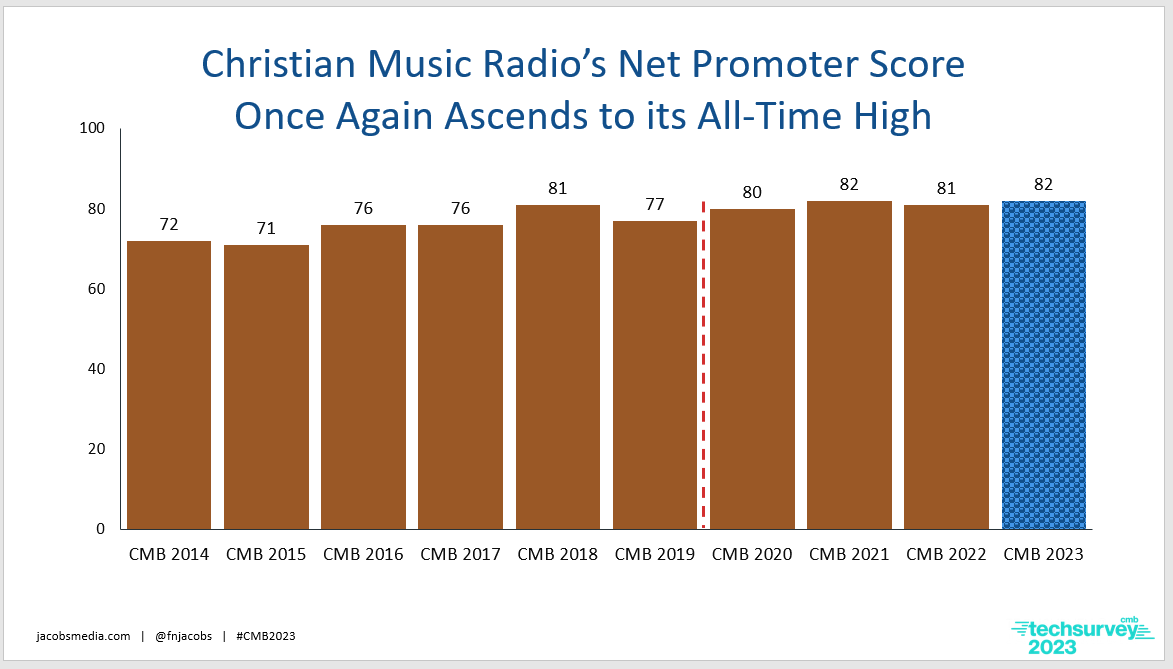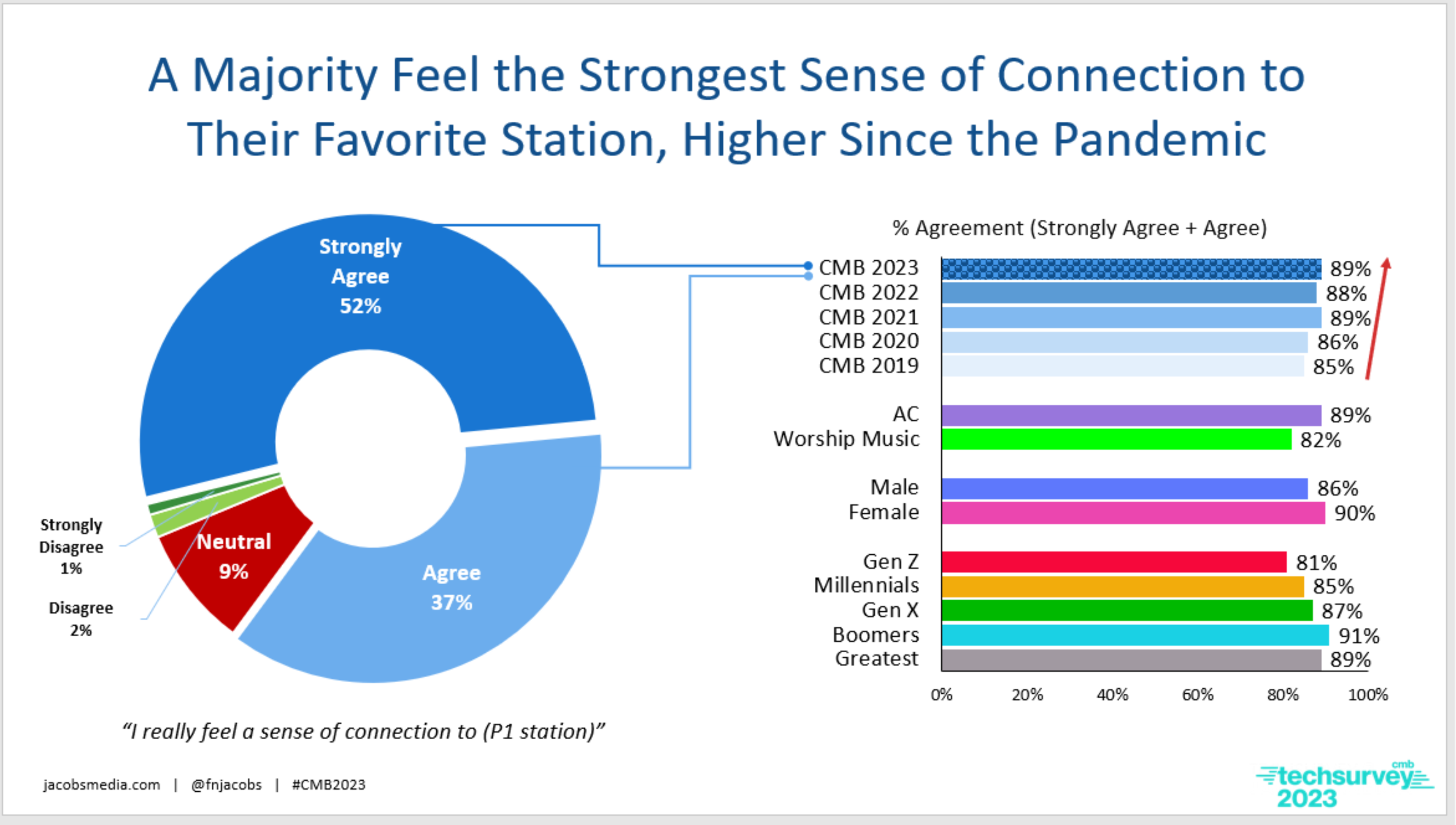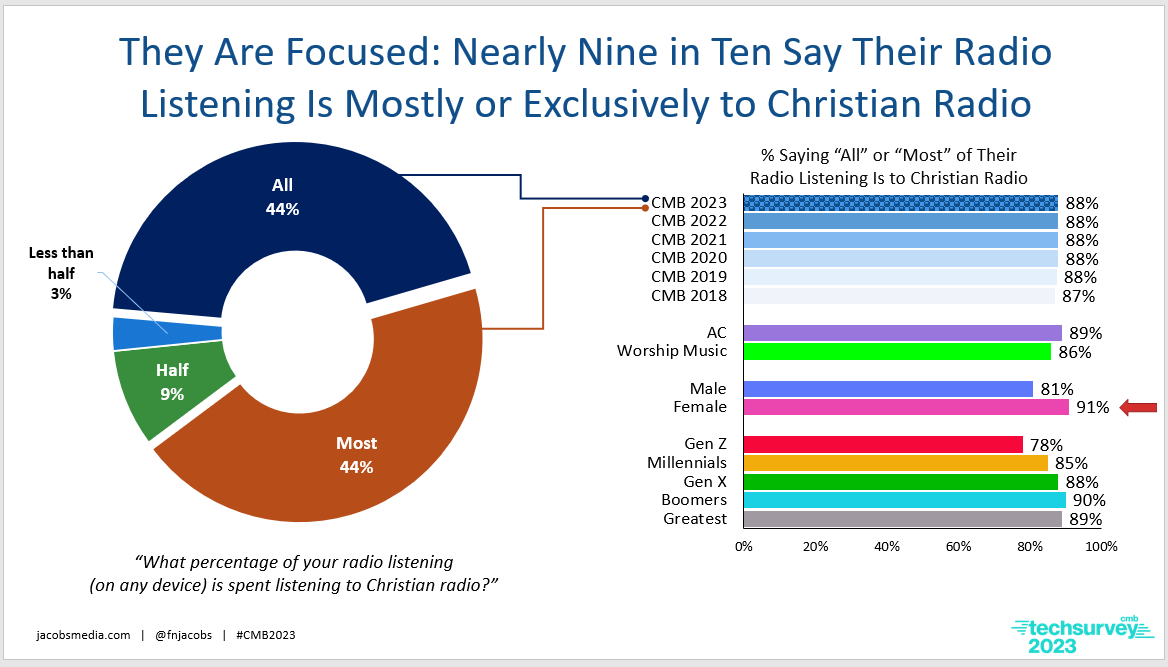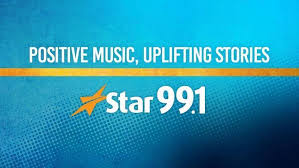
Having just returned from the NAB, I’ve spoken with many of you. And you’re asking the same question:
What was the mood at the show?
Of course, it’s complicated. Sure, there was much about AI – we knew that going in. But for the most part, I heard people talking about not rocking the boat, steady as she goes, and let’s wait to see what happens with political this year.
I get it. There is much uncertainty in the midst, especially as it relates to the state of radio in general. Q1 was indeed challenging for many companies, including Nielsen, who recently announced they’ll be recycling respondents (meaning: using them again) to try to make up for sampling shortfalls. In and of itself, that is a topic of conversation as we try to assess what we’ll learn about radio listening habits when we interview the same people, again and again.
Researcher Mark Ramsey weighed in on this new Nielsen policy on LinkedIn:
Speaking of ratings, Inside Radio reported on format ups and downs from the recently released March PPM reports. Here’s the headline that heralded the winners:
I’ve seen thousands of ratings stories over the years, but I don’t recall seeing a report like this one ever before. But in many ways, it signals a paradigm shift in the ratings. Come to think of it, pubic radio had a pretty impressive run around the pandemic, another “odd” ratings anomaly that vaulted a number of these stations in the Top 3 25-54 adults stratosphere.
For Contemporary Christian, it’s a ratings sweep – the only format where shares are up 6+, 18-34, 18-49, and 25-54. That’s a rare feat in the modern era where formats typically excel in some demos but falter in others.
And yet, this surge has been coming for a while. As we’ve discussed here in this blog, most of the station transactions in the past couple years have involved acquisitions of both AM and FM facilities by Christian broadcasters. While most radio owners in the U.S. have an unspoken moratorium on purchasing more properties, Christian organizations are often in growth mode. While commercial broadcasters are contracting and tightening, the outlook for Christian radio is expansive.
There have been numerous success stories around the country, but perhaps none more than spectacular than University of Northwestern-owned KTIS in St. Paul, Minnesota. I talked about this remarkable station in a blog post last year.
CMB (Christian Music Broadcasters) 2023 is our most recent Techsurvey for that format, and there are telltale signs that point to stronger brands and increase listening.
The Net Promoter Score – the word-of-mouth yardstick – is a good place to start. We’ve now conducted these studies for a decade. Looking back at this span of time, we’re seeing some of our best scores for Christian music stations at a time when there’s a downtrend for both commercial and public NPS performance:

Net Promoter Scores for both commercial and public radio have mostly dipped in the years following the pandemic. Meantime, Christian music radio scores are 10 points higher since we started conducting these surveys.
Their success goes well beyond recommendation. In fact, “connection” would be a better way to describe it. As the going has gotten tougher these past few years since the ravages of the pandemic, Christian music radio has been there for many of its listeners. You can see how this has played out below:

So, why is this happening – and why now?
Theories are likely numerous, and like most successes (and failures), it’s never just one thing. But I would chalk it up to these key reasons:
1. Right place, right time, right message – As the pressures – personal and work – have mounted, Christian radio has been there for people, offering a sense of relief, escape, solace, and yes, salvation. When we talk to these listeners in focus groups, they will often admit their troubles can often seem overwhelming, but the positive messages of faith they glean from these stations, their personalities, and their music are there in their time of need. No other radio can consistently play that role.
And maybe that explains the accompanying chart from CMB 23 showing most Christian music radio fans say it’s the only radio they always/mostly listen to. We never even talk about “exclusive cume” in the ratings anymore because it’s an antiquated data point. Most consumers aren’t loyal to radio stations or platforms. Their listening tends to be split across multiple content sources – except in Christian radio:

And the trending on this question (upper right on the chart) is spectacularly consistent, with most of the key demographic groups lining up nicely.
2. Slogans are emotionally meaningful – Radio stations slogans have always sounded like they were written by Sgt. Joe Friday: “Just the facts.” They almost always describe the station’s format/music: The Best Country, the Classic Rock Station, NewsRadio, etc.
In Christian radio, messaging tends to be emotionally based – wrapped around how the station makes you feel. That’s why you hear descriptors like “inspirational,” “uplifting,” “positive,” and “encouraging” rather than “most/best” promises that ring hollow because most everyone uses them.
wrapped around how the station makes you feel. That’s why you hear descriptors like “inspirational,” “uplifting,” “positive,” and “encouraging” rather than “most/best” promises that ring hollow because most everyone uses them.
They also don’t sound like marketing. And listeners will tell you they are authentic and ring true. Obviously, that sets them apart, too.
3. They own their music – Unlike other musical genres that are shared across the spectrum, you generally only hear Christian artists on Christian music stations – and nowhere else. Conversely, programmers of these stations tend to keep them “pure,” devoid of music that doesn’t match the spirit.
4. A strong listening experience – Most of these stations are non-commercial, so there’s no conventional advertising. Yes, there are fundraisers – often called “Shareathons.” The overall effect is clean and uncluttered, in contrast to most commercial radio stations.
5. They are positive and authentic – No one’s mean or snarky. There are no pranks. No fake calls or setups. No controversies or scandals. Just humans talking to humans.
6. They are great storytellers – Christian music stations have a foundation of “the greatest story every told.” So, it’s no wonder programmers encourage talent to hone their storytelling skills. Our research suggests the audience also enjoys telling their stories, an obvious connection between listeners and hosts.
7. They are mission driven – There truly is a higher power, and it’s not ratings and revenue. Don’t get me wrong – Christian radio programmers look at the ratings like everyone else does. They track their fundraising closely. But none of these metrics obscure their greater purpose. The lines have blurred, leaving stations – and NPR – trying to regain their equilibrium and the essence of what they stand for in 2024. Christian music radio stations have no such problem. They share a strong grasp of their audience and their purpose.
As radio broadcasters study format ratings trends looking for patterns, it’s hard not to take notice of what’s going on in Christian radio.
Amen.
- Who At Your Station Would The Audience Like To Have A Beer With? - May 20, 2025
- Lessons For Radio From The Recent Google Home Outage - May 19, 2025
- The Rock Hall’s Most Egregious Snub Yet? - May 16, 2025





Fred–I thought you might’ve mentioned in this post the recent Rolling Stone article about K-Love, which claimed that the network was trying to hide pro-Trump tendencies that still come out over the air. I think the author was not hiding the fact that she does not like CCM and is trying to refight the unsuccessful battles which saw the Sound, WPLJ, the Loop and WAAF, among many others, succumb to EMF’s cash-on-the-barrelhead purchases. Perhaps there is a feeling from college radio people that EMF and the other religious broadcasters are plotting to take away as many college radio stations as they can, as some organizations even admitted years ago they wanted to block NPR below 92. Now I believe that it isn’t fair for the audiences who genuinely like CCM stations to have what they like taken away from them, is the feelings I suspect many rock fans have legitimate?
I’m going to post this comment as a reply rather than a new, separate one, because I think Mark made some good points and I want this to be in that context.
First, I have always thought it unfair that EMF, being non-commercial and getting a constant stream of $$$ from their listeners in contributions, has been able in practically every situation to outbid any commercial broadcaster when a station was available for sale. And (especially where any of the major group broadcasters are in a market where EMF is acquiring) I sometimes think that there is a deliberate mindset that letting a station go “K-Love” strengthens the remaining stations. As Fred pointed out, CCM is a “pure” format musically, so EMF’s presence doesn’t directly take shares of listening away from the mainstream format. The problem with that, for me, is when there is no other station in a market that can accommodate musically the displaced listeners. The Rolling Stone article makes my point about that to a degree.
While we’re on the subject of “pure”, I believe that if you’re a non-comm you need to be in that part of the band. I’d rather have another EMF station at 89.3 than a third or fourth NPR station (and I’d force WBAI down there if I could as well). Commercial allocations are supposed to be just that … and I should point out that the more “preachy” Christian networks (like VCY. eccch) take advantage of the same ability to “remove” a commercial signal from a market. At least K-Love is listenable.
But the unfair advantage in bidding for available stations does exist, and that is what bothers me most. Well … that and the fact that I consider Mike Novak to be a traitor to the commercial radio that sustained him for so many years.
Mark, your comments are appreciated and well-taken. As someone who worked for The Sound, I was saddened when Entercom sold them, but never felt any sense of remorse because it was EMF who bought them. (We don’t work for them BTW.) It’s America. If you have the monney and the Commission approves the deal, you can do whatever you want – Hip-Hop, Jazz, or Christian Contemporary. There are no conspiracy theories or improprieties here – just good old fashioned capitalism.
It’s not a surprise that folks who religiously support their station would fill out a survey to give it a boost. If that’s the only station they follow, that’s the only one they’re going to credit, and they’ll take the time to do it. But if folks listen to more than one station, they may not have the passion to take the survey, thinking, “I’m too busy for this.”
Dianna, I believe it’s cynical to think Christian audiences inflate their stations’ results in Techsurvey – or in Nielsen surveys. The fact they listen to so much Christian radio (not always one station because there are usually two or more to choose from in many markets) might actually put more pressure on stations especially on issues like music repetition. After interviewing hundreds of these listeners in person (and virtually), I have come to believe they truly value what they’re getting because these stations speak to who they are, what they believe, and what they need. I respect your opinion, and encourage you to keep commenting.
While satellite radio hasn’t completely overtaken OTA radio, there’s a point to Sirius/XM that isn’t addressed much. The “V” word. Variety on Sirius is there-and commercial broadcasters could learn a lesson. Markets with multiple EMF signals, for example. Late night George Noory, Mark Levin broadcasts on multiple frequencies. Ryan Seacrest in multiple adjacent markets. I know they’re all cost-cutting moves, but it’s to the detriment of the medium in general. EMF and the others have a place on radio. The rules give them the ability to build 3 studios and put them on hundreds of signals. (There are nine K-LOVE frequencies in Minnesota alone.) Every city has a “fast food” row-imagine if they were all McDonald’s? Great for The Golden Arches, lousy for the consumer. How about cable companies? We have one where I live. As someone wrote several years ago, don’t blame EMF, blame the rules.
Dave (and Jerry), so much of this revolves around economic scale versus serving the public. I think it’s relatively easy to distinguish one strategy from the other. Their actions speak for themselves.
Thank you for a good comment Dave. The Christian station that bought out “The Loop” in Chicago has 3 (or 4) sub channels on their HD signal.
I’d get rid of my Sirius subscription if I had that many choices with “terrestrial” radio. But then what equipment is there to use at home.
But it seems like commercial radio has lost interest in
HD. Not to mention the cost of the license. When OTA TV went HD that technology was open source (and why there were so many brands of converter boxes).
As a funny antidote to my point one of the subs in Chicago is a sort of a re-creation of “The Loop”. Listening the other day and heard the “Top 40” version of Won’t Get Fooled Again. A version no classic rock station worth anything would play.
When most radio stations run 18-20 minutes of commercials an hour, listeners (who don’t have satellite radio) start looking for something else. Christian radio is acceptable to listeners from several formats, especially AC, who aren’t necessarily religious.
I wrote about this phenomenon eight months ago when KTIS in Minneapolis-St. Paul hit number one.
A phenomenon, it is, Andy. Thanks for chiming in.
My time outside of Christian radio (country and AC/CHR station) were relatively brief so my perspective may be skewed. But the connection with the audience in Christian radio is so far above those of other formats. Yes, you get great calls and have fun talking with listeners of any format. But there really is a “spiritual” bond in Christian radio. Only in Christian radio was I ever thanked by someone facing serious disease or loss or other heart wrenching crises for “brightening their corner of the world” or told by someone facing long bouts of depression that I taught them to “smile again.” You’ve mentioned the word “authentic” often in recent weeks, Fred, and when listeners and I are connecting, there is an authentic spiritual bond. As DC Talk said, “I don’t really care if they label me a Jesus Freak. There ain’t no denying the truth.”
Thanks for articulating this so well, David. I have learned a great deal about radio through our work with Christian broadcasters – and their audiences. None of what is happeninig now in the ratings is a suprise to me.